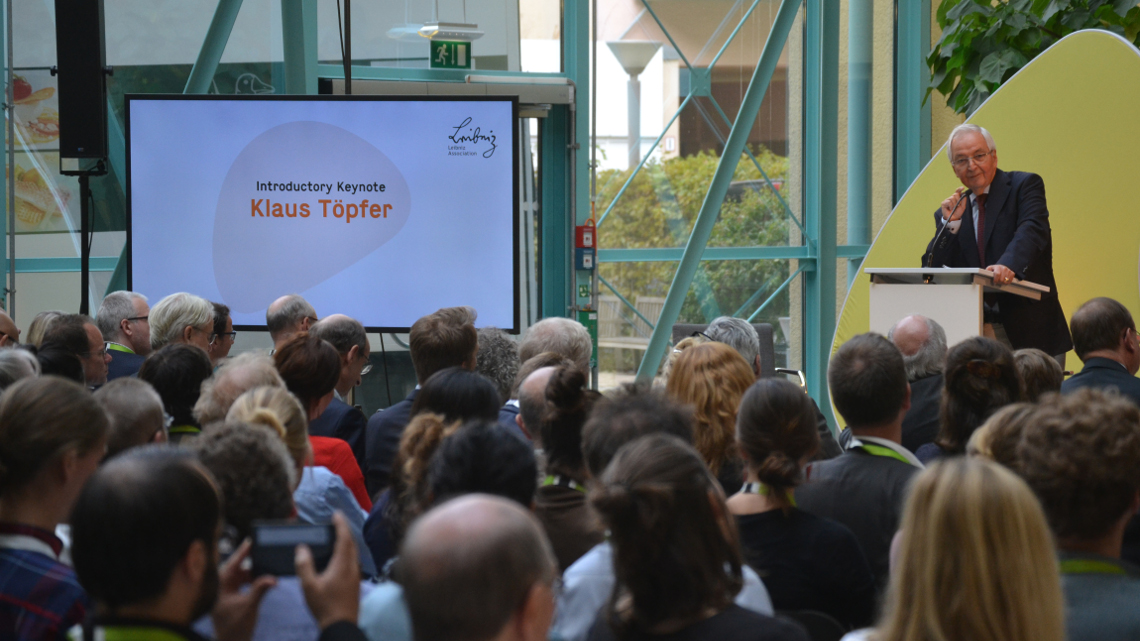Focus on sustainability research
How far has the implementation of the UN sustainability goals come? This and other questions were at the core of a Leibniz Association conference in Berlin in mid-September.

In 2015, the United Nations formulated 17 Sustainable Development Goals (SDGs). The goals are intended to help end poverty, protect the planet and achieve prosperity for all. The Leibniz Association therefore hosted a one-day conference on this topic in Berlin on 14 September. Experts from politics and science were invited to present and discuss the current state of research regarding the SDGs and their implementation. Almost 200 participants came to the Leibniz Association headquarter. In addition to the plenary lectures and the subsequent panel discussion, more than 40 scientists presented their latest research results on SDGs in a total of ten parallel sessions, each focussing on specific SDGs.
The future of mankind is at stake
Matthias Kleiner, President of the Leibniz Association, welcomed the participants of the conference with urging words: "We are concerned with no less than the future of mankind!" Therefore, he continued, he was pleased to see so many different research disciplines come together at the conference. "Only together can we solve the tasks at hand," said Kleiner. Ottmar Edenhofer, designated Co-Director of the Potsdam Institute for Climate Impact Research, also didn't hold back: "It is important to unite the natural sciences with the humanities and social sciences and to pull together!" According to Edenhofer, so-called "carbon pricing", i.e. the additional allocation of costs to carbon emissions, is an important step towards moving from a petroleum-based industry to a more sustainable one. In contrast, a mere expansion of the production of renewable raw materials was not an adequate solution: an investment into renewable raw materials would initially reduce the demand for and interest in carbon-based products. According to Edenhofer, however, the market would react to this with falling prices, which will in turn once again increase the consumption of these materials. "Due to the rebound effect investmening in the use of renewable raw materials would result in an increasing consumption of fossil fuels. We can only stop this through carbon pricing," said Edenhofer.
The market as the driving force
On the other hand, Klaus Töpfer, former Executive Director of the United Nations Environment Programme and Federal Minister for the Environment and Nuclear Safety from 1987 to 1994, had a completely different opinion: According to him, fiscal approaches won't work. Instead, Töpfer calls for politics as the legislator and pioneer on duty. At the same time he pointed out: "But what power does politics have today? The market is the driving force." And also science has little influence on politics despite clear-cut research results. "Researchers are collecting more and more data to prove climate change and its serious consequences. Nevertheless, not one industrial nation that has signed the Paris Climate Agreement has yet fulfilled its demands," warned Töpfer. "It is obvious that politics is not dancing to the beat of scientific drums."
In the subsequent panel discussion, a lively debate between Edenhofer and Töpfer ensued: "I am convinced that the Paris Climate Agreement will fail without carbon pricing," said Edenhofer. Töpfer replied: "If politicians are serious about climate protection, they must pass the appropriate laws. Anything else won't work."
Katharina Helming of the Leibniz Centre for Agricultural Landscape Research (ZALF) turned the focus of the discussion back to current, tangible events and hinted at a recent positive change: "This summer's drought has definitely brought politics and science closer together. Politicians nearly kicked down our doors looking and asking for new solutions."
Society needs to change
The afternoon of the conference offered ten paralell session, each focusing on specific sustainability goals. The sessions one again underlined that the individual SDGs can only be achieved in joint reasearch endeavours treating them as complementary goals. In addition, the presentations once again demonstrated that society as a whole needs to rethink its approach towards a sustainable economy - from nutrition to clothing.
The biggest hurdle to achieving the sustainability goals is therefore the application and implementation of new research results. Because although science has already gathered vast amounts of data for instance for amore efficient and sustainable agriculture or waste avoidance or biobased production approaches, there is an obvious lack of implementation of these results almost everywhere - in industry as well as in everyday life.
Success begets success
Thus, the question becomes: how could the implementation of research results be advanced? According to Stefan Sieber, an expert on food security in developing countries at ZALF, this can only be achieved through positive examples and success stories as well as the will of society. "Society must want to change. Good education and positive examples are the key to convincing people," said Sieber. Together with colleagues, Sieber had developed ovens for huts in Tanzania that require less wood for the same cooking output. Since less wood is needed, the women whose job it was to collect the wood, now have more time for other things. According to Siebers, such positive developments will make it easier for him and his colleagues to convince local people of new ideas and techniques in the future.
jmr


